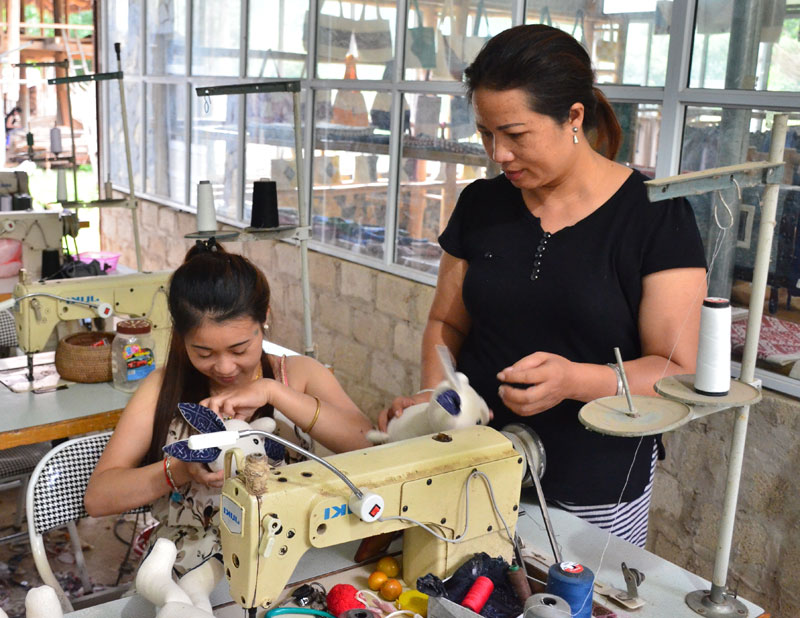
(HBO) – Upon arriving in Lac Village – located in Chieng Chau, in the Mai Chau district of Hoa Binh province – you will understand why the locals here have come to call Vi Thi Thuan, a Thai ethnic minority woman, "Co Tien”, or "Fairy” in English.

"Fairy” Vi Thi Thuan looks at the products made by a local
worker at the Thuan Hoa Social Protection Centre.
Her matronly name comes from her
dedication to caring for others and her ability to weave magic out of a
difficult situation.
Thuan decided to build a house for people
with disabilities in a bid that would not only allow them to make a living, but
also preserve the traditional art of brocade weaving. As such, the Thuan Hoa
Social Protection Centre was established on May 1, 2018.
Over the past decade, hundreds of women
with disabilities and those from difficult backgrounds have come to the centre,
which offers them stable employment and the opportunity to earn a living for
themselves.
The centre currently accommodates 35
ethnic minority women, including 11 people with disabilities, who are provided with
jobs and a stable income ranging from 2.5 to 4 million VND per month.
It was very challenging at the beginning
as this craft is difficult even for able-bodied people to master; for people
with disabilities, it can be a thousand times more difficult, Thuan recalled.
"I myself had no experience, only my courage
and enthusiasm, and so there were many times where I did not know what to do
first, and what to do later,” she said. "Fortunately, all the members here live
together in harmony, like the name of the centre "Thuan Hoa”. Thus, when
confronted with any challenges, we always encourage each other to overcome them
together.”
After many ups and downs, in 2016, the
centre was able to build a new workshop and separate rooms for 20 of the women living
here, as well as a showroom, two stilt houses for homestay services, and a
large yard for camping and the display of Thai ethnic minority items.
"Many difficulties remain ahead of us, but
we are still dedicated to crafting and selling traditional handicrafts that
reflect the cultural beauty of Thai people,” Thuan added.
In addition, she plans to develop a large
garden full of local flowers from the northwestern region in the future and
create a cultural space of Thai ethnic community in Mai Chau to serve tourism.
Thuan was awarded the title of brocade
weaving artisan by the Vietnam Craft Village Association three years in a row
from 2010 to 2013, and honoured by the President of the Vietnam Women’s Union
as an example of an excellent businesswoman from an ethnic minority group.
With an increasingly vibrant and widespread emulation movement aimed at building cultured residential areas and cultured families, Yen Thuy District has been making steady progress toward improving both the material and spiritual well-being of its people, while fostering a civilized, prosperous, beautiful, and progressive community.
Once lacking recreational spaces and community facilities, Residential Group 2 in Quynh Lam Ward (Hoa Binh City) has recently received attention for the construction of a new, spacious, and fully equipped cultural house. The project followed the model of state support combined with public contributions in both labor and funding.
The "All people unite to build cultural life" movement, which has been effectively integrated with Kim Boi district’s socio-economic development goals, is fostering a lively spirit of emulation across local residential areas, hamlets, villages, public agencies, and enterprises. In addition, through the initiative, traditional cultural values are being preserved and promoted, while community solidarity and mutual support in poverty reduction and economic development are being strengthened.
A working delegation of the Hoa Binh provincial People’s Committee led by its Permanent Vice Chairman Nguyen Van Toan on June 11 inspected the progress of a project to build the Mo Muong Cultural Heritage Conservation Space linked to tourism services in Hop Phong commune, Cao Phong district.
Born and growing in the heroic land of Muong Dong, Dinh Thi Kieu Dung, a resident in Bo town of Kim Boi district, in her childhood was nurtured by the sweet lullabies of her grandmother and mother. These melodies deeply imprinted on her soul, becoming an inseparable part of her love for her ethnic group's culture. For over 20 years, this love for her hometown has driven Dung to research, collect, and pass down the cultural values of the Muong people to future generations.
In the final days of May, the Ethnic Art Troupe of Hoa Binh Province organized performances to serve the people in remote, mountainous, and particularly disadvantaged areas within the province. These were not just ordinary artistic shows, but they were the meaningful journeys aimed at spreading cultural values, enhancing the spiritual life of the people and contributing to the preservation of ethnic minority cultural identities.



